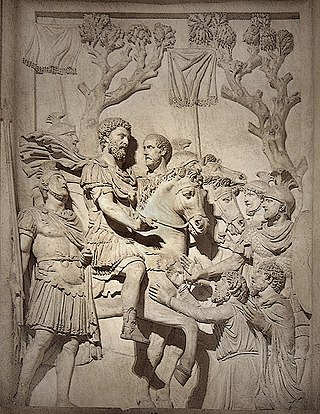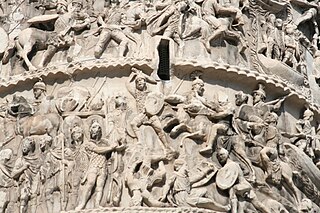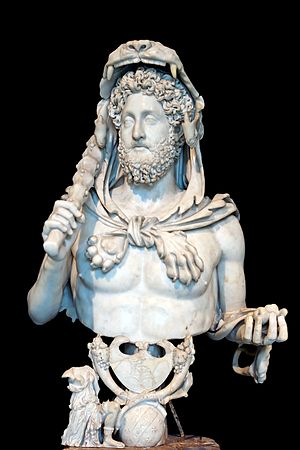
Marcus Aurelius Antoninus was Roman emperor from 161 to 180 and a Stoic philosopher. He was a member of the Nerva–Antonine dynasty, the last of the rulers later known as the Five Good Emperors and the last emperor of the Pax Romana, an age of relative peace, calm, and stability for the Roman Empire lasting from 27 BC to 180 AD. He served as Roman consul in 140, 145, and 161.

The 120s was a decade that ran from January 1, AD 120, to December 31, AD 129.

The 130s was a decade that ran from January 1, 130, to December 31, 139.
The 150s decade ran from January 1, 150, to December 31, 159.
The 160s decade ran from January 1, 160, to December 31, 169.
The 170s decade ran from January 1, 170, to December 31, 179.
The 180s decade ran from January 1, 180, to December 31, 189.
The 190s decade ran from January 1, 190, to December 31, 199.
Year 165 (CLXV) was a common year starting on Monday of the Julian calendar. At the time, it was known as the Year of the Consulship of Orfitus and Pudens. The denomination 165 for this year has been used since the early medieval period, when the Anno Domini calendar era became the prevalent method in Europe for naming years.
Year 175 (CLXXV) was a common year starting on Saturday of the Julian calendar. At the time, it was known as the Year of the Consulship of Piso and Iulianus. The denomination 175 for this year has been used since the early medieval period, when the Anno Domini calendar era became the prevalent method in Europe for naming years.
Year 195 (CXCV) was a common year starting on Wednesday of the Julian calendar. At the time, it was known in Rome as the Year of the Consulship of Scrapula and Clemens. The denomination 195 for this year has been used since the early medieval period, when the Anno Domini calendar era became the prevalent method in Europe for naming years.
Year 169 (CLXIX) was a common year starting on Saturday of the Julian calendar. At the time, it was known as the Year of the Consulship of Senecio and Apollinaris. The denomination 169 for this year has been used since the early medieval period, when the Anno Domini calendar era became the prevalent method in Europe for naming years.
Year 190 (CXC) was a common year starting on Thursday of the Julian calendar. At the time, it was known as the Year of the Consulship of Aurelius and Sura. The denomination 190 for this year has been used since the early medieval period, when the Anno Domini calendar era became the prevalent method in Europe for naming years.
Year 177 (CLXXVII) was a common year starting on Tuesday of the Julian calendar. At the time, it was known as the Year of the Consulship of Commodus and Plautius. The denomination 177 for this year has been used since the early medieval period, when the Anno Domini calendar era became the prevalent method in Europe for naming years.
Year 176 (CLXXVI) was a leap year starting on Sunday of the Julian calendar. At the time, it was known as the Year of the Consulship of Proculus and Aper. The denomination 176 for this year has been used since the early medieval period, when the Anno Domini calendar era became the prevalent method in Europe for naming years.

Commodus was a Roman emperor who ruled from 177 until his assassination in 192. For the first three years of his reign, he was co-emperor with his father Marcus Aurelius. Commodus's sole rule, starting with the death of Marcus in 180, is commonly thought to mark the end of a golden age of peace and prosperity in the history of the Roman Empire.

Tiberius Claudius Pompeianus was a politician and military commander during the 2nd century in the Roman Empire. A general under Emperor Marcus Aurelius, Pompeianus distinguished himself during Rome's wars against the Parthians and the Marcomanni. He was a member of the imperial family due to his marriage to Lucilla, a daughter of Marcus Aurelius, and was a key figure during the emperor's reign. Pompeianus was offered the imperial throne three times, though he refused to claim the title for himself.

The Marcomannic Wars were a series of wars lasting from about AD 166 until 180. These wars pitted the Roman Empire against principally the Germanic Marcomanni and Quadi and the Sarmatian Iazyges; there were related conflicts with several other Germanic, Sarmatian, and Gothic peoples along both sides of the whole length of the Roman Empire's northeastern European border, the river Danube.

The reign of Marcus Aurelius began with his accession on 7 March 161 following the death of his adoptive father, Antoninus Pius, and ended with his own death on 17 March 180. Marcus first ruled jointly with his adoptive brother, Lucius Verus. They shared the throne until Lucius' death in 169. Marcus was succeeded by his son Commodus, who had been made co-emperor in 177.

Roman Empire is a television docudrama based on historical events of the Roman Empire. The show is in the anthology format with each season presenting an independent story. Season 1, "Reign of Blood", is a six-part story about Emperor Commodus. Jeremiah Murphy and Peter Sherman collaborated on writing the first season, with Richard Lopez directing. It premiered on Netflix on November 11, 2016. Season 2, "Master of Rome", premiered on July 27, 2018; it is a five-part story about the rise of Dictator Julius Caesar and the fall of the Roman Republic. Season 3, "The Mad Emperor", premiered on Netflix on April 5, 2019, and is a four-part story about Emperor Caligula.








